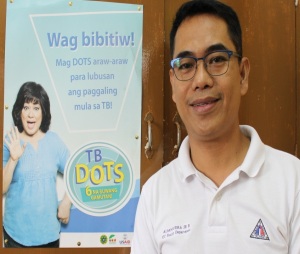Edgar Almoguera, Sr., has been working as a public health nurse in Old Balara Health Center in Quezon City, Metro Manila, since 1994. Primary healthcare services such as maternal and child care and TB directly observed treatment, short-course (DOTS) are provided by the center to 14,800 families in this urban neighborhood, or barangay.
As the supply officer in his unit, he often experienced stock-outs. “In the past, there was no systematic way to request our TB medicines. I only received what had been allocated by the district office. The allocation was not always based on the number of patients. To add to the stock-out problem, I’ve also been challenged by organizing our medicines, given our unit’s lack of storage area,” Edgar said.

Access to quality medicines and other commodities are essential to the delivery of TB services. Despite significant efforts in the overall management of the TB supply chain in the Philippines, medicine and supply stock-outs, poor storage conditions, lack of inventory management and reporting, and limited health staff capacity in managing supplies and medicines have been observed in health facilities.
The United States Agency for International Development (USAID)-funded Systems for Improved Access to Pharmaceuticals and Services (SIAPS) program provides technical assistance to the National TB Control Program (NTP) in the overall management of the TB supply chain with focus on forecasting, quantification, procurement, storage and distribution. NTP, with the technical assistance of SIAPS, developed the Practical Guide for the Management of Pharmaceuticals and Health-Related Commodities (PGMP). This manual outlines the standards in supply chain management and is being rolled-out by NTP to regional, provincial, city and barangay health units nationwide.
Edgar is one of the first health workers to receive the training on PGMP. In the training, the participants learn guidelines for managing TB medicines and supplies, as well as how to accomplish medicine requisition based on actual patient cases.
Four months after the PGMP training, Old Balara Health Center has improved its inventory and storage management. With Edgar’s leadership and the support of his colleagues, TB medicines have been re-organized to conform to guidelines, expiries are now being monitored, and stock cards are being regularly updated.
“Constructing a bigger storage area is a huge endeavor. It is my responsibility to be resourceful in implementing simple actions so that the medicines I dispense are of good quality and do not harm our patients,” Edgar said. He has also lobbied the local government unit for the provision of storage cabinets.
IMPROVING INVENTORY MANAGEMENT AND RECORD-KEEPING
Sound decisions addressing gaps in the supply chain are based on available, accurate, and reliable inventory information. However, most of the community health facilities in the Philippines do not maintain or update stock cards, and inventory reports do not usually correspond to actual counts.
Quezon City District 3 health staff also received training on the use of the TB tracking tool. This tool, developed by SIAPS, is a simple Excel-based inventory tool that is used by the nine health centers in this district.
Initially, the TB tracking tool was designed to improve the recording and reporting on the movement of TB medicines. With the inputs of the partners, the TB tracking tool has expanded to calculate the requisition requirements of the health centers. At the time of writing, facilities in District 3 Quezon City submit monthly requisitions based on the number of patients enrolled in the TB registry. A main goal of SIAPS is to assist NTP in re-establishing a “pull system” requisition in the country.
BUILDING CAPACITY FOR SUPPLY CHAIN MANAGEMENT
Capacity-building activities on supply chain management are part of the Barangay Health Management Council (BHMC) initiative being implemented in Quezon City with the support of SIAPS. The BHMC is a grassroots health program leadership and management model that has been piloted in the barangay Payatas in Quezon City in 2011, and later expanded to District 3 of Quezon City. BHMCs are now being used for health programs other than TB control, including maternal health and nutrition.
One key in supporting the sustainability of supply chain management systems is to have a functional community-driven management structure such as the BHMC. Aside from increasing the knowledge and skills of the frontline health staff, Quezon City District 3 and SIAPS are working to enhance the overall coordination and management of the TB supply chain in the district.

